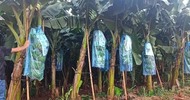The terms of farmland deals are hardly made public. Although a theoretical possibility exists in a few cases for some transfer of technology for agricultural development, risk also exists to peasant farmers who cannot compete with well-resourced commercial farms. Take, for instance, the case of barley and oilseeds producers in Ethiopia.
- Abugida Info
-
13 August 2009
"Nous n’allons ni acheter, ni louer, ni acquérir des terres africaines pour produire des aliments afin de satisfaire nos propres besoins,’’ l’envoyé extraordinaire du gouvernement chinois, l’ambassadeur Liu Guijin, a réaffirmé, vendredi à Dakar
Because of the political sensitivity of the modern-day land grab, it is often only the country's head of state who knows the details. Der Spiegel investigates.
"The government has verified and delineated 1.6 million hectares of virgin land suitable for large-scale commercial farming in different parts of the country," Esayas Kebede, Director of the recently formed Agricultural Investment Support told Reuters.
The Lao government says it's determined to improve the lives of its people by attracting foreign money. But in a country where simply putting food on the table is a daily challenge for many, their foreign investment may hinder more than help.
If the host state and foreign investors act in conformity with these suggestions, they will maximise the prospects that any large-scale land transaction benefits all stakeholders and minimise the chances of concluding harmful deals.
Professeur de géographie politique et du développement à l’université Bordeaux-III et spécialiste des questions foncières en Afrique, Christian Bouquet nous livre sa réflexion sur l’évolution de ce phénomène inquiétant.
- Jeune Afrique
-
22 July 2009
A South Korean provincial government has leased a major plot of farmland in Mindoro to grow corn
- Philippine Star
-
20 July 2009
As for the Chinese delegation and those of them who had the chance to state their minds one did not get the impression at all as regards purchase of land
- Sudan Tribune
-
20 July 2009
The Philippine government hopes it can sideline land reform by leasing lands to foreign governments and corporations.
Ouyang Riping, PDG d’une société agricole chinoise, a une mission : transformer le Sénégal en grenier à sésame… pour la Chine ! Dakar lui cède 60 000 hectares pour cultiver et exporter le sésame vers Pékin. En échange, les chinois apprennent aux paysans sénégalais à obtenir deux récoltes de riz par an. Coopération originale ou marché de dupes ?
- cDurable.info
-
17 July 2009
Los inversionistas de Arabia Saudita y de China están cada vez más interesados en adquirir tierras agrícolas en Brasil.
- Radioagencia NP
-
16 July 2009














